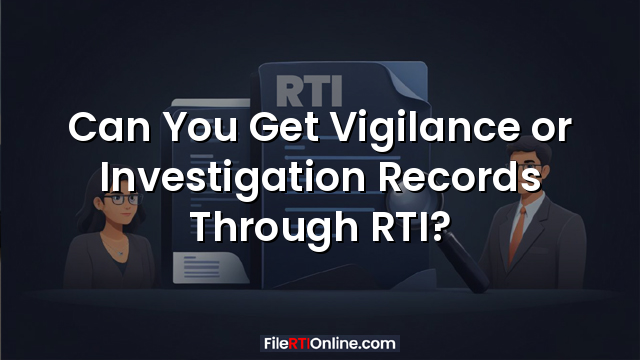Can You Get Vigilance or Investigation Records Through RTI? What the Law Allows and What It Prohibits
Many RTI applicants try to obtain vigilance, investigation, or corruption-related records from authorities like the CVC, CBI, Railways, or other departments. However, such information often involves ongoing inquiries or prosecution. This raises the key question:
Are vigilance case records completely exempt from RTI under Section 8(1)(h)?
A major Central Information Commission (CIC) decision clarifies this:
No, vigilance files cannot be given a blanket exemption. The PIO must examine the records and give a reasoned, speaking order.
This article explains what you can and cannot access, and uses a real CIC case to illustrate how Section 8(1)(h) works.
Understanding Section 8(1)(h) of the RTI Act
Section 8(1)(h) allows denial of information if disclosure would:
“impede the process of investigation or apprehension or prosecution of offenders.”
However, the exemption is not automatic and not blanket.
The authority must:
· Apply their mind
· Identify which parts may actually affect the investigation or prosecution
· Give reasons for withholding information
· Disclose non-exempt portions
What Type of Vigilance Information Is Usually Restricted?
You generally cannot access:
· Ongoing investigation reports
· Internal assessment or analysis reports
· Sensitive file notings that may compromise witnesses
· Material directly linked to prosecution strategy
· Internal CVC/CBI correspondence during investigation
These can genuinely affect investigation or trial proceedings.
What Type of Vigilance Information May Be Disclosed?
You may get, depending on the case status:
· Records of closed investigations
· Documents that do not affect the trial
· Administrative documents unrelated to evidence
· Communications that are already part of the court record
· Broad updates or status (e.g., “investigation completed”, “under trial”)
The PIO must segregate these.
CIC Case Example: Request for Complete Vigilance Files
Background of the Case
An applicant sought from the Central Vigilance Commission (CVC):
· Copies of the entire file relating to two CBI cases
· All file notings
· All correspondence with the Ministry of Railways and CBI
The CVC PIO denied everything, invoking Section 8(1)(h), claiming disclosure would impede the process of investigation.
Applicant’s Argument Before CIC
The appellant argued:
1. The PIO cannot issue a blanket denial without reasons.
2. Not all records would impede investigation; some portions may be harmless.
3. The PIO must apply his mind, segregate records, and justify each denial.
CIC Decision
The CIC agreed with the appellant.
The Commission noted:
· The PIO’s order was not a reasoned order.
· The case had reached a trial court stage.
· Only those records whose disclosure would genuinely impede prosecution can be denied.
· Other parts should be disclosed after proper scrutiny.
The CIC directed the PIO to:
· Revisit all records
· Segregate what can be disclosed
· Provide copies of non-exempt documents
· Issue a speaking, reasoned order if denying any portion
This case clearly establishes that vigilance files cannot be denied wholesale.
Key Takeaways for RTI Applicants
1. You can ask for vigilance case information, but not everything will be given.
2. PIOs must justify each denial; they cannot hide an entire file under Section 8(1)(h).
3. If the investigation is over and the matter is in court, more information becomes disclosable.
4. You can challenge vague or blanket denials before the First Appeal or the CIC.
How to Frame RTI Queries to Avoid Rejection
Instead of asking for “entire file”, ask for:
· “Copies of documents that can be disclosed without affecting investigation or prosecution.”
· “Status of the case.”
· “Name of the officer handling the vigilance inquiry.”
· “Final outcome, if the investigation has been completed.”
· “Portions of the record that are not protected under Section 8(1)(h).”
This language increases your chances of receiving information.
Conclusion
Vigilance and investigation records are sensitive and often linked to ongoing legal processes. While Section 8(1)(h) protects such information, it does not allow a broad, automatic exemption. Each RTI request must be evaluated carefully, and only the specific portions that would impede investigation or prosecution can be denied.
The CIC’s ruling makes it clear:
No authority can hide an entire vigilance file without a proper, reasoned justification.


